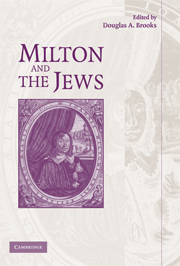Book contents
- Frontmatter
- Contents
- Acknowledgments
- Contributors
- 1 Introduction: Milton and the Jews: “A Project never so seasonable, and necessary, as now!”
- 2 England, Israel, and the Jews in Milton's Prose, 1649–1660
- 3 Milton's Peculiar Nation
- 4 Making Use of the Jews: Milton and Philo-Semitism
- 5 Milton and Solomonic Education
- 6 T. S. Eliot, Anti-Semitism, and the Milton Controversy
- 7 A Metaphorical Jew: The Carnal, the Literal, and the Miltonic
- 8 “The people of Asia and with them the Jews”: Israel, Asia, and England in Milton's Writings
- 9 Returning to Egypt: “The Jew,” “the Turk,” and the English Republic
- Select Bibliography
- Index
2 - England, Israel, and the Jews in Milton's Prose, 1649–1660
Published online by Cambridge University Press: 02 July 2009
- Frontmatter
- Contents
- Acknowledgments
- Contributors
- 1 Introduction: Milton and the Jews: “A Project never so seasonable, and necessary, as now!”
- 2 England, Israel, and the Jews in Milton's Prose, 1649–1660
- 3 Milton's Peculiar Nation
- 4 Making Use of the Jews: Milton and Philo-Semitism
- 5 Milton and Solomonic Education
- 6 T. S. Eliot, Anti-Semitism, and the Milton Controversy
- 7 A Metaphorical Jew: The Carnal, the Literal, and the Miltonic
- 8 “The people of Asia and with them the Jews”: Israel, Asia, and England in Milton's Writings
- 9 Returning to Egypt: “The Jew,” “the Turk,” and the English Republic
- Select Bibliography
- Index
Summary
Milton's attitude towards the readmission of the Jews has long been an object of puzzlement. He was close with people in the Samuel Hartlib circle who expressed tolerant attitudes towards the Jews and were interested in their readmission, believing the conversion of the Jews would be part of the millennial reign of Christ on Earth. Milton's friend, Moses Wall, was the translator of Rabbi Menasseh ben Israel's The Hope of Israel (1650), which prepared the way for Menasseh's petition to Cromwell and his Council in 1655. For a time in the 1640s and 1650s, Christian millenarianism and Jewish messianism intersected, as some Christians and Jews were drawn together by a shared sense of impending end times that led to interest in readmitting the Jews to England. And yet Milton, despite an early millenarian strain, was curiously silent on the issue of readmission. Although as secretary of foreign tongues to the Council of State he could hardly have been unaware of the controversy over readmission, he recorded in his writing no comments that directly reveal his stance. More than forty years ago, Don Wolfe remarked on Milton's “failure to speak for the Jews,” and Jeffrey Shoulson has recently noted that Milton mentions the matter of toleration and conversion only twice in his prose, and then only briefly.
Milton's “real” opinion of Jews and his attitude towards Jewish readmission are, arguably, unknowable.
- Type
- Chapter
- Information
- Milton and the Jews , pp. 13 - 34Publisher: Cambridge University PressPrint publication year: 2008
- 2
- Cited by



